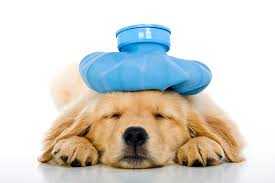
Cancer & Dogs: A Guide to Awareness & Prevention
Posted on: February 12, 2025
Author: Steve Wagner
For dog lovers, our furry companions are more than pets—they’re family. Unfortunately, just as humans face health challenges, dogs are increasingly diagnosed with cancer, a disease that has become a leading cause of death among our four-legged friends. Understanding the risks, early warning signs, and preventive measures can make a profound difference in your dog’s quality of life.
The Grim Reality: Cancer and Dog Mortality
Cancer is a leading cause of death in dogs over the age of ten, with nearly 50% of dogs over ten years old developing some form of cancer. The American Veterinary Medical Association (AVMA) reports that approximately one in four dogs will develop cancer during their lifetime. While these statistics are sobering, advancements in veterinary medicine offer hope, and early detection can significantly improve outcomes.
Recognizing Early Warning Signs
Being attuned to changes in your dog’s behavior and physical health is crucial. Here are some early warning signs that could indicate cancer:
- Lumps or Bumps: Not all lumps are cancerous, but any new growth should be examined by a veterinarian.
- Unexplained Weight Loss: A sudden drop in weight without a change in diet or exercise.
- Loss of Appetite: Persistent reluctance to eat could be a red flag.
- Lethargy: A noticeable decline in energy or interest in activities they once enjoyed.
- Difficulty Breathing: Labored breathing or coughing might indicate tumors in the chest.
- Changes in Bathroom Habits: Blood in stool or urine, or difficulty urinating or defecating.
- Non-healing Sores: Wounds that do not heal over time.
- Abnormal Odors: Unusual smells from the mouth, ears, or other areas.
- Limping or Swelling: Persistent limping or localized swelling, which could indicate bone cancer.
- Behavioral Changes: Increased aggression, withdrawal, or signs of pain.
If you notice any of these signs, consult your veterinarian promptly. Early diagnosis can be life-saving.
Preventive Steps to Protect Your Dog
While some cancers are genetic and unavoidable, there are proactive steps you can take to reduce your dog’s risk:
1. Regular Veterinary Checkups
Annual or bi-annual checkups allow your veterinarian to monitor your dog’s health closely and catch potential issues early.
2. Healthy Diet and Exercise
A balanced diet and regular exercise help maintain a healthy weight, reducing the risk of obesity-related cancers.
3. Spaying and Neutering
Studies suggest that spaying or neutering can lower the risk of certain cancers, such as mammary or testicular cancer.
4. Avoiding Carcinogens
Limit your dog’s exposure to known carcinogens like secondhand smoke, pesticides, and harsh household chemicals.
5. Vaccinations
Keep up with vaccinations, as some viruses, like canine papillomavirus, can increase cancer risk.
6. Sun Protection
Light-colored or thin-coated dogs are susceptible to skin cancer. Use pet-safe sunscreen on exposed areas.
7. Dental Care
Good oral hygiene reduces the risk of oral cancers. Brush your dog’s teeth regularly and provide dental chews.
8. Genetic Testing
For breeds prone to cancer, genetic testing can help identify risks and inform proactive care strategies.
9. Avoid Over-vaccination
Discuss vaccination schedules with your vet to ensure they’re tailored to your dog’s specific needs.
Best Places to Purchase Preparedness Items
Having the right tools and resources on hand can make managing your dog’s health easier. Here are some reliable options for purchasing pet health and wellness products:
- Chewy: Offers a wide range of pet health supplies, including dental care products and supplements.
- Petco and Petsmart: Both provide cancer-prevention items like sunscreen and high-quality dog food.
- Your Veterinarian’s Office: Often stocks specialized products and can recommend trusted brands.
- Amazon: Convenient for purchasing items like dog toothbrushes, supplements, and natural cleaning products.
- Local Pet Stores: Many carry organic and locally sourced pet foods and supplements.
A Heartfelt Message From a Dog Lover
Losing a dog to cancer is an emotional journey that left an indelible mark on my heart:
“Cody was more than a pet; he was my best friend, my confidant, and my source of endless joy. When he was diagnosed with lymphoma, I felt helpless. But through his illness, Cody taught me the importance of living in the moment and cherishing every wag of his tail. Though I lost him, his memory inspires me to advocate for cancer awareness in dogs. If I could give one piece of advice, it’s this: love them fiercely and be vigilant about their health. Cody may be gone, but his legacy lives on in every dog I meet.”
Conclusion
Cancer in dogs is a challenging reality, but awareness, early detection, and proactive care can make a world of difference. By staying informed and taking preventive steps, you can give your dog the best chance at a long, healthy, and happy life. Love your pets, care for them, and never take a single moment for granted.
Insurish, LLC, headquartered in Northville, MI, offers a variety of pet health insurance policies. Contact us if you need further guidance to choose the ideal coverage for you. Get a free quote today!
If you enjoyed this blog, we’d love it if you shared it with others!




